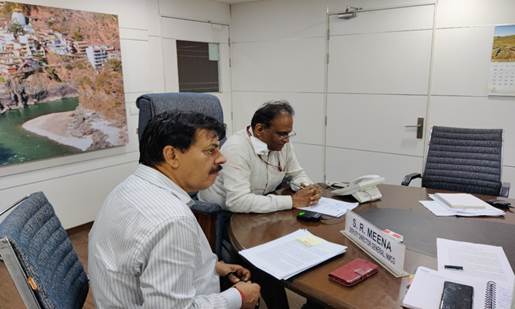Ministry of Jal Shakti
NMCG Organises Webinar On Waste Water Management
6th Edition Of Monthly ‘Webinar With Universities’ Series On ‘Igniting Young Minds, Rejuvenating Rivers’
Under The Leadership Of Prime Minister, Shri Narendra Modi, Water In India Is Being Viewed As A Key Natural Resource: DG, NMCG
DG, NMCG Urges Youngsters To Focus On 5Rs Concept Of Circular Economy For Water – Reduce, Recycle, Reuse, Rejuvenate & Respect
Posted On:
09 MAY 2022 6:55PM by PIB Delhi
The National Mission for Clean Ganga (NMCG) in association with APAC News Network virtually organised the 6th Edition of the monthly ‘Webinar with Universities’ series on ‘Igniting Young Minds, Rejuvenating Rivers’ today. The theme for the webinar was ‘Waste Water Management.’ The session was presided over by Shri G. Asok Kumar, Director General, NMCG. Delivering his keynote address, Shri G. Asok Kumar began by shedding some light on various issues emerging across the country jeopardizing the water security and increasingly being manifested in the form of climate change which is now evident. He emphasized on the urgent need to find solutions to the issues pertaining to water sector so that the next generation would not have to face such problems.
The DG NMCG said “In 2014, Prime Minister launched the Swachh Bharat Abhiyan which became a huge success. In 2019, various departments dealing with water issues were merged to form the Jal Shakti Ministry to holistically deal with the challenges. This was followed by the launch and execution of Jal Shakti Abhiyan-1 and Jal Shakti Abhiyan-2: Catch the Rain, Where it Falls, When it Falls, focusing on asset creation & awareness generation and rainwater harvesting respectively. Under the leadership of Prime Minister, water in India is being viewed as a key natural resource.”

Emphasizing on the importance of wastewater management, Shri Kumar quoted examples of countries like Israel and Singapore, who are doing some outstanding work in the field of recycling and reuse of water. “The technologies are available; all we need to do is work around them according to our specific needs,” he said, adding, “One of the most important areas is agriculture which consume more than 80% of our water resources. The reuse of treated water for non-potable purposes like agriculture is the need-of-the-hour to ensure that the next generation gets water.”
DG, NMCG further added that monetization of sludge and treated water is one of the focus areas of Namami Gange Programme under the banner of ‘Arth Ganga’, which means linking people with Ganga through a ‘Bridge of Economics’. He said that under Namami Gange Programme, around 164 Sewage Treatment Plants are being constructed worth Rs. 25000 crores that will help to treat around 5000 MLD of wastewater, resulting in major saving of freshwater resources. Shri Kumar exhorted the younger generation to adhere to the 5R Concept of Circular Economy that includes Reducing Wastage, Recycling Water, Reusing Water, Rejuvenating Rivers and most importantly, Respecting Water.
The leading educators who participated in the session included Shri Aditya Berlia, Co-Promoter, Apeejay Education, New Delhi, Prof. Shrihari Prakash Honwad, President, Sir Padampat Singhania University, Udaipur, Dr. Sujata Shahi, Vice Chancellor, IILM University, Gurugram and Prof. Naveen Singhal, Dean & Coordinator, Center of Excellence “LAW” Land, Air and Water, DIT University, Dehradun. Shri S.R. Meena, Deputy Director General, NMCG, also graced the occasion. Students from Chitkara School of Business and Apeejay also joined the webinar and interacted with NMCG on issues of wastewater management.
Among the leading educators, Mr. Aditya Berlia and Dr. Sujata Shahi emphasized on the enormity of the task and the role younger generation will have to play in keeping the water resources of the country clean. Mr. Berlia said that awareness generation and community-led efforts are the key. “In addition to the cultural and spiritual significance of River Ganga, we must also focus on the economic benefits of the river as well,” he added.
Dr. Shahi pointed out that it is the social and behavioral change in the young generation that is a requisite for a programme like Namami Gange and that could be brought about by proper communication. She said that from story-telling to sensitization on the issues of River Rejuvenation to face-to-face communication, a targeted dissemination of information must be done to bring about the desired change. She said that one should have an “entrepreneur approach” when dealing with such issues. Prof. Naveen Singhal also laid emphasis on the responsibility young leaders have to take to make Namami Gange a people’s movement.
Prof. Shrihari Prakash Honwad cited examples of some international rivers and campaigns with respect to environmental issues including river rejuvenation and said that there is a need to create a “generation with cleanliness conscious’ and everything else will automatically fall into place. “We must go to schools and we must build this consciousness. We must tell the younger generation that we couldn’t do enough, help us correct it so that we can return the resources (natural) back to you,” Shri Honwad added.
********
BY/AS
(Release ID: 1823954)
Visitor Counter : 1884